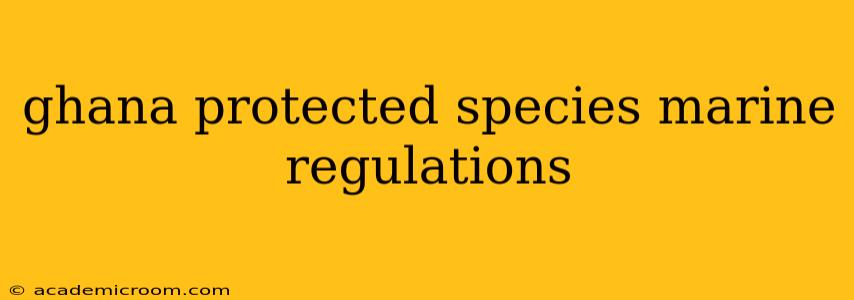Ghana boasts a rich and diverse marine ecosystem, home to numerous species crucial for biodiversity and the nation's economy. However, this delicate balance faces threats from overfishing, pollution, and habitat destruction. To safeguard this invaluable resource, Ghana has implemented a series of regulations aimed at protecting its marine species. Understanding these regulations is vital for conservation efforts and sustainable marine resource management.
What marine species are protected in Ghana?
Ghana's protected marine species list isn't explicitly published as a single, easily accessible document. Instead, protection is afforded through various legislative acts and regulations targeting specific species or habitats. These include, but are not limited to:
- Marine mammals: Dolphins, whales, and dugongs are generally afforded protection under broader wildlife laws, prohibiting hunting and disturbing their habitats. Specific regulations may vary depending on the species.
- Sea turtles: All six species of sea turtles found in Ghanaian waters are protected, with prohibitions against hunting, capturing, or harming them, as well as the destruction of their nesting sites.
- Coral reefs: While not explicitly listing specific coral species, legislation protects coral reef ecosystems from destructive fishing practices and pollution. This indirectly protects the myriad species that depend on these vital habitats.
- Certain fish species: While many fish are subject to fishing quotas and size restrictions, some commercially valuable species might receive additional protection during breeding seasons or if their populations decline significantly. These designations would be outlined in fishing regulations.
- Other invertebrates: Other vulnerable invertebrates, such as certain species of sea cucumbers and shellfish, may be subject to protection or regulated harvesting practices to ensure sustainable populations.
What are the penalties for violating marine regulations in Ghana?
Penalties for violating Ghana's marine regulations vary significantly based on the specific infraction and the legislation involved. Generally, penalties can include:
- Fines: These can range from relatively small amounts for minor offenses to substantial sums for serious violations, such as illegal fishing of protected species.
- Imprisonment: In cases of severe violations, imprisonment is a possible penalty.
- Confiscation of equipment: Boats, fishing gear, and other equipment used in illegal activities may be confiscated by authorities.
- License revocation: Fishing licenses can be revoked for repeated violations or serious offenses.
How are these regulations enforced?
Enforcement of Ghana's marine regulations falls under the responsibility of several government agencies, including the Fisheries Commission and the Wildlife Division. Enforcement strategies include:
- Patrolling coastal waters: Regular patrols by marine officials help to deter illegal activities and apprehend offenders.
- Monitoring fishing activities: Surveillance and monitoring of fishing vessels and activities contribute to ensuring compliance with regulations.
- Community engagement: Involving local communities in conservation efforts helps raise awareness and encourage responsible fishing practices.
- International collaboration: Ghana collaborates with international organizations and neighboring countries to combat illegal fishing and protect shared marine resources.
What organizations are involved in protecting Ghana's marine environment?
Besides government agencies, several organizations contribute to the protection of Ghana's marine environment, including:
- Non-governmental organizations (NGOs): Many NGOs work to raise awareness, conduct research, and implement conservation projects.
- Research institutions: Universities and research institutions conduct studies on marine ecosystems and contribute to informed policy-making.
- International organizations: International bodies provide support for conservation efforts through funding, technical assistance, and capacity building.
Where can I find more information on Ghana's marine protected areas?
Specific details on marine protected areas (MPAs) within Ghana and their respective regulations are best found through official government resources such as the website of the Fisheries Commission and the Ministry of Fisheries and Aquaculture Development. You may also find relevant information through reputable environmental NGOs operating in Ghana. Remember to verify information against official sources to ensure accuracy.
This overview provides a general understanding of Ghana's protected marine species and related regulations. It's crucial to consult official government sources for the most up-to-date and detailed information. The complexities of marine conservation require ongoing effort and collaboration to ensure the long-term health and sustainability of Ghana's valuable marine resources.
